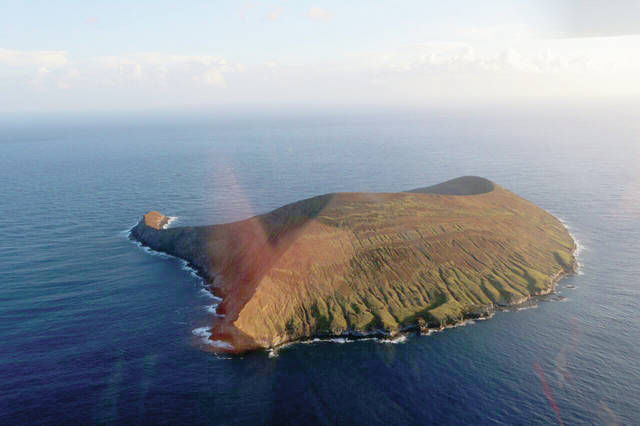LIHUE — The Department of Land and Natural Resources says it’s moving forward with the plan to drop more than 10 tons of rodenticide on Lehua Island, as soon as permits are approved. And Rep. Dee Morikawa is requesting for
LIHUE — The Department of Land and Natural Resources says it’s moving forward with the plan to drop more than 10 tons of rodenticide on Lehua Island, as soon as permits are approved.
And Rep. Dee Morikawa is requesting for a second time that the state press pause until community concerns have been answered.
But an Aug. 8 letter from DLNR’s Suzanne Case to Morikawa says the project will continue because the final Environmental Assessment has addressed community’s concerns.
“We feel that the FEA provides answers for the questions summarized here (in Morikawa’s Aug 2 letter), which are taken to be representative of questions from the July 25 meeting (in Waimea),” Case wrote.
She continued: “It is regrettable that the decorum of the public meeting on July 25 did not allow for a productive question-and-answer session.”
But, Morikawa, who first requested a delay and further public meetings on Aug. 2, said that’s not a good enough reason to stop engaging with the public on the issue.
“People are angry and they want answers. Just because one meeting got a little rowdy doesn’t mean the state should give up on public transparency and protecting our natural resources,” she said in a statement to TGI.
She continued: “Chair Case says this rat poisoning project is safe and all questions have been answered in the EA. If that is true, hold a public meeting and explain it to the public. That’s the state’s responsibility.”
Morikawa said community concerns involve impacts to the environment — including effects to monk seals, sea turtles, fish, and corals; the timing of the drop in relation to hurricane season; and the potential of using an unlicensed poison in the project.
She also questions the project in light of the 2009 failed attempt to eradicate the rats on Lehua.
Case confirmed to Morikawa in her letter that the poison brodifacoum is an alternative poison, and isn’t currently licensed in Hawaii. Part of the process should the brodifacoum be considered is to consult with HDOA to see if it can be licensed.
The project is scheduled taking weather patterns into consideration, she said, and the plan has been tweaked to accommodate for the factors that let some rats slip through the cracks in the 2009 attempt.
2015 trials of the poison showed no significant impacts to fish, sea turtles, coral and monk seals, Case said, and the final EA details the assessment of risks to marine life.
“Given the relatively low toxicity of the product being used and the successful use of this technique around the world, we feel confident that the project will succeed in removing rats with no significant impact to the surrounding environment,” Case said in the letter.
But, Morikawa says her constituents are demanding clearer answers to their concerns.
“The state needs to take this issue seriously,” Morikawa wrote. “The effects of rat poison in the waters around Lehua Island can have serious consequences for aquatic life. This can directly affect the lives and livelihoods of area residents.”
Some Kauai and Niihau residents have also voiced concerns in a letter sent to Sen. Ron Kouchi, signed by 53 individuals who live on both islands, asking for help in halting the project.
The only thing blocking the first helicopter drop of the poison onto the island is an aerial application permit through the Department of Agriculture, which has yet to be signed by DOA head Scott Enright.
“I did talk to Enright on Friday (Aug. 4) and I know he wasn’t planning to have that signed for a week and a half or so, to see if there’s more information,” Kouchi said.
Rep. Jimmy Tokioka, District 15, said while the conversation isn’t directly happening in his district, he’s keeping tabs on the issue and asking questions because it affects his constituents.
“The fishermen that live in my district are the same fishermen that go fishing in those waters and we need to make sure that there will be no impacts to fishermen in that area,” Tokioka said.
He’s not convinced another public meeting is going to change the situation, though.
“Is another meeting going to help? Not if the director of DLNR has already made up her mind that they’re going to do it,” Tokioka said.


